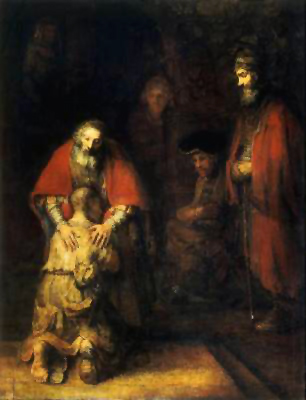My dear brothers and sisters in the Lord,
 As we celebrate Father’s Day this Sunday, our knowledge of human fatherhood must take its understanding from our knowledge of God’s paternity. Perhaps one Gospel parable that best explains the Father’s love is Jesus’ story of the Prodigal Son, or as it is sometimes called The Forgiving Father.
As we celebrate Father’s Day this Sunday, our knowledge of human fatherhood must take its understanding from our knowledge of God’s paternity. Perhaps one Gospel parable that best explains the Father’s love is Jesus’ story of the Prodigal Son, or as it is sometimes called The Forgiving Father.
The prodigal son’s life was one of dissolute living. But when he finally comes to his senses in a far land where he is reduced to feeding pigs, the prodigal son says, “How many of my father’s hired men have more than enough bread, but I am dying here with hunger! I will get up and go to my father, and will say to him, ‘Father, I have sinned against heaven, and in your sight; I am no longer worthy to be called your son; make me as one of your hired men’” (Luke 15: 18-20). To his surprise, the loving father, who divided his inheritance for him and who each day looked into the horizon to see if his son would return, spies his prodigal son and runs out to meet him.
The welcome of the prodigal son has been the subject of many artistic and poetic descriptions. One of the most famous is Rembrandt’s painting entitled The Prodigal Son, which hangs in the Hermitage Museum in St. Petersburg, Russia. His is a unique representation of this most famous biblical scene. We see a father embracing a son, who has a sandal on one foot and not the other. Standing to the side is the presumed good brother who watches in disdain. There seems to be a wise servant seated, watching the embrace of father and son. Most interestingly, however, there is a female figure to the right of the loving father. Most probably, this is the mother of the prodigal son. Rembrandt’s depiction of this family portrait gives us some insight into the biblical scene.
The embrace between father and son is the culmination of the forgiving father’s gesture of acceptance. The parable, however, does not end there. The other son, the good son, becomes jealous of his father’s treatment of the prodigal son. The father killed the fatted calf, puts sandals on his son’s feet, a ring on his finger and gives a feast in his honor.
The celebration was all too much for the good son to bear. He was jealous of his father’s treatment of the prodigal son. And the good son reminded his father that he was the one who stayed at home and remained loyal to his father. But the father loved both of his sons. The father replied, “This son of mine was dead and has come to life again; he was lost and has been found.”
In our society today, the actions of the forgiving father are very much needed to restore confidence in human paternity. During the Jubilee Year of 2000, the United States Conference of Catholic Bishops aired some television spots. One of these spots was a modern-day adaptation of this Gospel parable. It portrayed a father and a son who had not spoken for many years and invited them during the Jubilee Year to reconcile and begin again. There was a tremendous favorable response to that television spot. Sometimes we need to see an action in gestures of reconciliation, so that we might imitate them in our own lives.
On this Father’s Day, I am sure there unfortunately exist many rifts between a father and his child. What a wonderful day on which to imagine the loving and forgiving father and the prodigal son embracing, returning to the peace of family life. If you know of some situation creating a rift between father and child, perhaps an encouraging word might lead either one to reconcile. Perhaps praying for reconciliation in our society would also be a wonderful way to celebrate this Father’s Day.
Priests also play a prominent role as father figures in the Church, as well as the image of the bishop as the chief shepherd and father of the flock. As we celebrate the secularly instituted holiday of Father’s Day, remember we who serve as fathers in the Church and the physical fathers who guard and guide their own families.
Fatherhood is always an exercise in putting out into the deep, of taking greater responsibility for others and sacrificing self. Please join with me in praying for all fathers on this special day.
